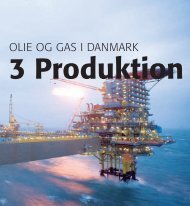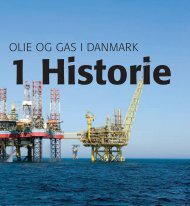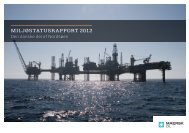Environmental statement - Flyndre and Cawdor - Maersk Oil
Environmental statement - Flyndre and Cawdor - Maersk Oil
Environmental statement - Flyndre and Cawdor - Maersk Oil
You also want an ePaper? Increase the reach of your titles
YUMPU automatically turns print PDFs into web optimized ePapers that Google loves.
<strong>Flyndre</strong> <strong>and</strong> <strong>Cawdor</strong> <strong>Environmental</strong> Statement<br />
Appendix A - Register of <strong>Environmental</strong> Legislation<br />
discharges<br />
Other minor oily<br />
discharges<br />
<strong>Oil</strong>y s<strong>and</strong> <strong>and</strong><br />
sludge<br />
Combustion<br />
emissions<br />
Energy Act 2008 (Consequential<br />
Modifications) (Offshore <strong>Environmental</strong><br />
Protection) Order 2010)<br />
The Offshore Petroleum Activities (<strong>Oil</strong><br />
Pollution Prevention <strong>and</strong> Control) Regulations<br />
2005 (as amended 2011) (as amended by the<br />
Energy Act 2008 (Consequential<br />
Modifications) (Offshore <strong>Environmental</strong><br />
Protection) Order 2010)<br />
The Offshore Petroleum Activities (<strong>Oil</strong><br />
Pollution Prevention <strong>and</strong> Control) Regulations<br />
2005 (as amended 2011) (as amended by the<br />
Energy Act 2008 (Consequential<br />
Modifications) (Offshore <strong>Environmental</strong><br />
Protection) Order 2010)<br />
EC Directive 2008/1 on Integrated Pollution<br />
Prevention <strong>and</strong> Control (IPPC) (replacing EC<br />
Directive 96/61) (as amended by EC Directive<br />
2009/31)<br />
Pollution Prevention <strong>and</strong> Control Act 1999<br />
(applies to waters outside the 3nm limit)<br />
<strong>Environmental</strong> Permitting (Engl<strong>and</strong> <strong>and</strong> Wales)<br />
Regulations 2007 (as amended 2010)<br />
The Pollution Prevention <strong>and</strong> Control<br />
(Scotl<strong>and</strong>) Regulations 2000 (as amended<br />
2008)<br />
Permits extend to both installations <strong>and</strong> pipeline under the Offshore Petroleum Activities (<strong>Oil</strong> Pollution Prevention <strong>and</strong> Control)<br />
(Amendment) 2011. Specific monitoring <strong>and</strong> reporting requirements are included on each schedule permit <strong>and</strong> reporting is via EEMS.<br />
Note: Under the Energy Act 2008 (Consequential Modifications) (Offshore <strong>Environmental</strong> Protection) Order 2010, permits now extend<br />
to CCS activities.<br />
Regulator: DECC<br />
The OPPA requires a permit for minor oily discharges such as those associated with BOP actuation, subsea valve actuation, subsea<br />
production start‐up <strong>and</strong> pipeline disconnection. Specific monitoring <strong>and</strong> reporting requirements are included on each schedule permit<br />
<strong>and</strong> reporting is via EEMS.<br />
Note: Under the Energy Act 2008 (Consequential Modifications) (Offshore <strong>Environmental</strong> Protection) Order 2010, permits now extend<br />
to CCS activities.<br />
Regulator: DECC<br />
The OPPA requires permits for discharge of oily substances to sea with measurement <strong>and</strong> reporting of total oil <strong>and</strong> s<strong>and</strong> discharged. A<br />
permit is required to discharge oil contaminated s<strong>and</strong> <strong>and</strong> scale. Under the 2011 amendments, permits now extend to pipelines.<br />
Note: Under the Energy Act 2008 (Consequential Modifications) (Offshore <strong>Environmental</strong> Protection) Order 2010, permits now extend<br />
to carbon sequestration activities<br />
The IPPC Directive requires industrial <strong>and</strong> agricultural activities with a high pollution potential to have a permit. This permit can only be<br />
issued if certain environmental conditions are met, so that the companies themselves bear responsibility for preventing <strong>and</strong> reducing<br />
any pollution they may cause.<br />
Annex I of the Directive defines all applicable industrial <strong>and</strong> agricultural activities, including combustion installations located on offshore<br />
oil <strong>and</strong> gas platforms <strong>and</strong>, under EC 2009/31, CCS installations where an item of combustion plant on its own, or together with any other<br />
combustion plant installed on a platform, has a rated thermal input exceeding 50 MW(th).<br />
Regulator: DECC<br />
The Pollution Prevention <strong>and</strong> Control Act 1999 implements the EC IPPC Directive into UK law. More specifically Sections 1 <strong>and</strong> 2 of the<br />
Act confer on the Secretary of State power to make regulations providing for a new pollution control system to meet the requirements<br />
of the IPPC Directive <strong>and</strong> for other measures to prevent <strong>and</strong> control pollution.<br />
The Pollution Prevention <strong>and</strong> Control (Scotl<strong>and</strong>) Regulations 2000 enact the IPPC Directive in Scotl<strong>and</strong> <strong>and</strong> were made under the<br />
Pollution Prevention <strong>and</strong> Control Act 1999.<br />
The <strong>Environmental</strong> Permitting (Engl<strong>and</strong> <strong>and</strong> Wales) Regulations 2007 came into force on 6 th April 2008 making existing legislation more<br />
efficient by combining Pollution Prevention <strong>and</strong> Control <strong>and</strong> Waste Management Licensing regulations. These were extended by the<br />
<strong>Environmental</strong> Permitting (Engl<strong>and</strong> <strong>and</strong> Wales) (Amendment) (No.2) Regulations 2010 which aim to simplify the permitting process <strong>and</strong><br />
came into force October 1 st 2010.<br />
The regulations require operators to apply for a permit for new offshore combustion processes which are to be permanently installed<br />
D/4114/2011 A ‐ 19








